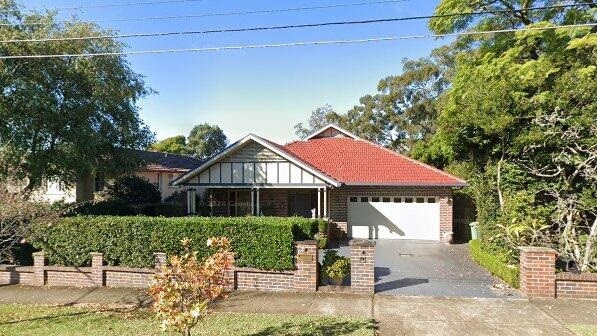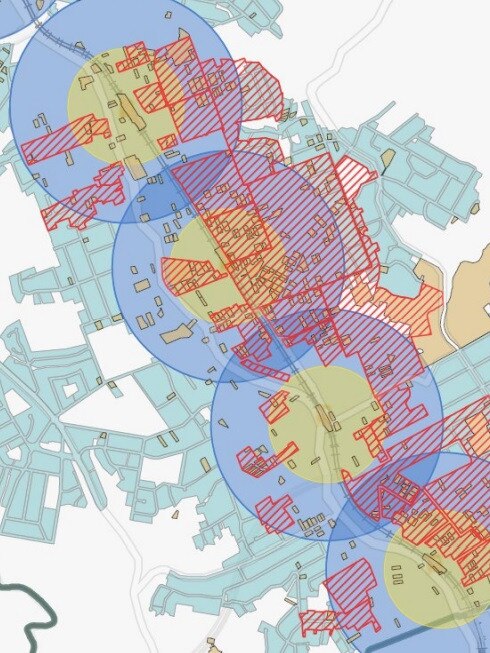Sydney residents join forces to sell homes as ‘super lots’ to cash in on NSW Government rezoning changes
Groups of Sydney neighbours are joining forces to sell their homes as combined ‘super lots’ to developers in a move agents say enables them to cash in the government’s push for increased density in residential areas.
North Shore
Don't miss out on the headlines from North Shore. Followed categories will be added to My News.
A group of north shore neighbours have joined forces to sell their properties as a combined ‘super lot’ to prospective developers – just weeks after the enactment of new planning laws that make it easier for multistorey homes to be bulldozed for increased density.
Members of Ku-ring-gai Council’s heritage reference committee have raised alarm bells over a real estate listing for five homes on Oliver Rd in Roseville which are being advertised as a ‘residential development opportunity’.
The five adjoining properties are all located within a heritage conservation zone and back on to three heritage listed properties on Roseville Rd.
The sale is being viewed as an early example of how new planning laws – known as the Transport Oriented Development program that encourages mid to medium density housing near train stations – could impact the region’s low-density streetscapes.
Members of the heritage committee voiced concerns that the substantive planning changes could “permit a density and form of development that is incompatible with heritage conservation”.

The property listing describes the combined super lot as “opportunity for a developer to acquire a development site while taking advantage of the NSW Government’s Transport Oriented Development program to develop a luxury residential apartment development”.
The properties are located 274m from Roseville Station and have a combined size of almost 5000sq m.
Daniel McMahon, of property firm Colliers which is advertising the site, said the properties were among a growing list of ‘super lots’ on the north shore where neighbours have joined forces to capitalise on the rezoning changes.


“I’m aware of upwards of 10 groups that have formed in that area and we’ve met with a further 40 or 50 who have expressed interest,” he said.
“The planning uplift (allowed under the rezoning changes) has provided an uplift in the value of people’s homes and that’s given owners the opportunity and incentive to sell.
“There’s a lot of interest from buyers as well – both from larger developers and local developers.”
Despite the homes being located within a heritage conservation zone, Mr McMahon said he was confident of the site’s development potential.

“Heritage conservation areas are quite vast on the upper north shore so to find sites for increased density that aren’t in those zones is challenging especially given Ku-ring-gai has high housing targets to meet,” he said.
“There’s a strong demand from local buyers looking to downsize and stay in the area but as the government keeps saying there’s a lack of options for apartments where they can live.”
The sale comes as modelling by Ku-ring-gai shows the planning changes could impact upwards of 2000 heritage homes across the local government area.

About 40 per cent of the properties impacted by the planning changes are protected by an individual heritage listing or located within heritage conservation areas.
Under the planning laws, councils will not be able to refuse development proposals based on heritage merits alone.
Lisa Trueman, an independent heritage adviser who has studied the potential impacts of the rezoning changes, believes the planning laws are “incompatible” with the intention of heritage protection laws.

“As the new standards seek specifically to increase density, they will lead to substantial changes to scale, subdivision patterns, landscaping, streetscapes, building typology and character within heritage conservation areas,” she said.
“Given the non-refusal policies (to refuse development proposals), it seems likely that local heritage controls will be unable to be enforced, with irreversible loss of heritage.
“This will have a devastating and irreversible impact on the character and significance of large numbers of individual heritage items.”
Ku-ring-gai Mayor Sam Ngai – who has opposed the rezoning changes – said increased development in heritage areas could lead to a “Swiss cheese effect in our suburbs” with “multiple high-rise buildings surrounding heritage properties”.
Ku-ring-gai Council is currently taking legal action against the government’s housing reforms – claiming there is “ambiguity inherent in the new planning controls”.
Mapping by the council shows other suburbs expected to be highly impacted by the planning changes including Killara, Gordon and Lindfield.





